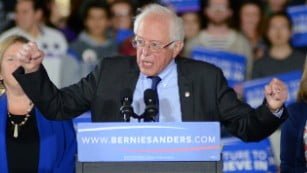Saturday was a big day for Bernie Sanders’ quest for the Democratic presidential nomination as he swept to resounding victories in the caucus states of Hawaii, Washington and Alaska. But the delegate math is still in Hillary Clinton’s favor.
“We knew things were going to improve as we headed West,” Sanders said at a jubilant rally before 8,000 people in Madison, Wisconsin — a state that will hold the next major contest in 10 days. “We have a path toward victory.”
Takeaways from Western Saturday
Clinton built up her delegate lead on the back of a strong run in the South, and Sanders argued Saturday his campaign always knew those states would be tough. In Madison, he said the map now offers more opportunities for his campaign as the contest progressed, largely because his wins are being powered by huge turnout among younger voters.
“With your help we’re going to win right here in Wisconsin,” he said. “So don’t let anyone tell you we can’t win the nomination, or win the general election. We’re going to do both of those things.”
But even with his big victories on Saturday, Sanders faces steep hurdles in catching Clinton in the delegate count. While Washington had 101 delegates up for grabs, and both candidates spent a significant amount of time there, Hawaii and Alaska were relatively small prizes — with just 25 and 16 delegates at stake respectively.
Clinton’s campaign privately acknowledged that Saturday would be a good one for Sanders, and her efforts in Washington were aimed mostly at trying to keep the race relatively close, as delegates are distributed proportionally. But with over 90% delegates accounted for, Sanders held a wide lead over Clinton in Washington, 72% to 28%. Alaska was more lopsided: Sanders won 80% to 20%.
Even though Wisconsin could be fertile territory for Sanders on April 5, Clinton is poised to do well in her home state of New York on April 19 with its 247 pledged delegates. She also faces favorable territory in the upcoming Super Tuesday contest on April 26 when Pennsylvania, Connecticut, Delaware, Rhode Island and Maryland voters head to the polls and nearly 400 pledged delegates are at stake.
While Sanders shaved Clinton’s lead in the delegate count, the former secretary of state had amassed 1,711 of the 2,383 delegates she would need to clinch the nomination before Saturday’s contests, according to CNN estimates. Before the voting Saturday, Sanders had notched 952 delegates to date. That means he would need to win 75% of the remaining pledged delegates to defeat her.
Clinton did not address the results publicly on Saturday, but her campaign sought to raise money off her losses in Saturday’s contests, portraying them as a warning to donors. A short time after CNN projected Alaska as a win for Sanders, Clinton Campaign Manager Robby Mook circulated an email to her supporters billed as a “quick update on Bernie Sanders.”
“We haven’t caught up in online fundraising, and our opponent could do very well in today’s caucuses in Washington, Alaska, and Hawaii,” Mook said in the email before the Washington and Hawaii results had been called. “Now, I don’t want to paint too gloomy a picture — you’ve been amazing. Thanks to you, we still have a commanding delegate lead, and we can secure this nomination for Hillary with your help,” he said, asking them to “chip in.”
Sanders’s strategists have argued that their unique fundraising capabilities could help them pull off an upset — arguing that the process for Clinton was “frontloaded” and that they have grassroots fundraising resources that past campaigns have lacked.
Washington and Alaska had always looked to be favorable territory for Sanders, because they are predominantly white and rural — states with the kind of demographic makeup that has favored Sanders.
“He’s obviously doing well in these Western caucus states, because you get a very committed base of younger voters who are willing to show up and stand in line in states like Idaho and Utah for hours,” said veteran Democratic strategist Bill Carrick, who is unaligned in the presidential race this cycle. “The message that Sanders has is a classic western populist message: Wall Street is sticking it to us, these big money interests are sticking it to us, and we’re out here scrambling, paying pretty heavy negative dividends for their behavior.”
But Clinton had campaigned in Washington after losing to Barack Obama by about a 2-1 margin in 2008. Her campaign made a major push to get voters to return Washington’s version of absentee ballots — known as “surrogate affidavits” — mailing them directly to voters with postage-paid return envelopes.
Given those efforts, the size of Sanders’s margins on Saturday served as a warning shot to Clinton, allowing him to make the argument at his rally in Madison that he was “making significant inroads” into Clinton’s delegate lead.
Superdelegate strategy
That is key to the Sanders strategy going forward, particularly when it comes to swaying superdelegates, who could be key at the Democratic Convention in July. Currently Clinton has the edge with some 482 superdelegates pledging to support her, according to CNN estimates. But Sanders allies point out those people can always change their minds.
“There are hundreds of other superdelegates, by the way, who are uncommitted,” Sanders campaign manager Jeff Weaver told CNN’s Suzanne Malveaux in an interview Saturday. “For them, it would be very easy for them to be with the Secretary, but they’re not which tells you something about where they probably are.”
“Superdelegates want to win in November,” Weaver continued, “and as we demonstrate in the second half of this primary season that we have the momentum, that we can carry with large margins these states, and with the public polls which have shown consistently that Bernie Sanders does better against every single possible Republican than does Hillary Clinton — I think superdelegates are going to begin to take another look.”
The excitement for Sanders, marked by a large rally at Seattle’s Safeco Field Friday evening, is something Sanders is counting on as he heads in to the delegate-rich contests that favor Clinton on the East Coast.
Dan Schnur, director of the Jesse M. Unruh Institute of Politics at the University of Southern California, said Sanders wins in small and medium-sized states “almost certainly will not be enough to derail Clinton from the nomination,” but adds there’s more to it for the Vermont senator.
“For all practical purposes, winning states like these are talking points for Sanders,” Schnur said. “But for what he’s after at this point, talking points might be good enough. In other words, winning Alaska and Hawaii isn’t going to keep Clinton from getting the nomination, but it keeps his supporters enthused; it keeps the money coming in; and allows him to continue having a platform.”
Big turnout in Hawaii
Polling had been scarce in Hawaii and Alaska, making it difficult to predict the outcome of those contests heading in to Saturday, but Sanders outspent Clinton on the airwaves.
Sanders’s wife Jane campaigned in Hawaii last Sunday and Monday with popular Rep. Tulsi Gabbard, who broke with Democratic Party leadership to show her support for Sanders.
Still, Clinton’s ties to Hawaii date back to 1992 when she campaigned in Honolulu for her husband. Her campaign is well organized in Hawaii and she has racked up endorsements from key state leaders including Sens. Mazie Hirono and Brian Schatz, as well as former Gov. George Ariyoshi.
This week Sanders released an emotional ad featuring Gabbard, who served a 12-month tour in Iraq, talking about the importance of Sanders’ vote against the Iraq War and his pledge to “take the trillions of dollars that are sent on these interventionist, regime change, unnecessary wars, and invest it here at home.”
“The American people are not looking to settle for inches,” Gabbard says in the ad. “They’re looking for real change.”
As in other states, turnout was high in Hawaii on Saturday. There were long lines outside Manoa Elementary in Honolulu as voting got started at 1 p.m. local time Saturday.
Officials were expecting at least 15% more Democratic voters than eight years ago when 37,583 Democrats voted. This year, the party protectively printed 100,000 ballots, Hawaii Democratic spokesperson Ethan Oki said.




